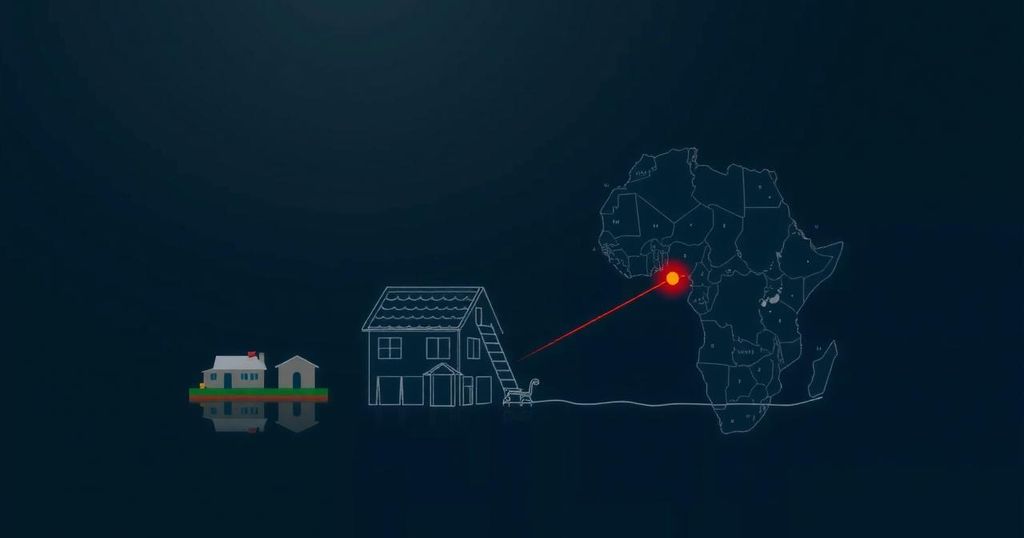Devastating Flooding in Chad, Nigeria, and Cameroon: A Humanitarian Emergency

Severe flooding in Chad, Nigeria, and Cameroon has adversely affected over 2.7 million people due to relentless rains, resulting in significant destruction of homes, farmland, and livestock. The situation poses severe hunger risks as the regions strive for aid amidst already critical food insecurity. Action Against Hunger is calling for immediate funding to support emergency relief and long-term recovery efforts.
Severe flooding caused by relentless torrential rains has impacted over 2.7 million individuals across Chad, Nigeria, and Cameroon, raising alarming hunger concerns in an already vulnerable region. The crisis, which encompasses 1.7 million affected in Chad, 1 million in Nigeria, and over 230,000 in Cameroon, has prompted Action Against Hunger to urgently call for funding to facilitate a timely emergency response to support the most affected populations. In Chad, the rains have persisted since late July, severely affecting several provinces such as Lac, Mayo-Kebbi Est, Mandoul, Tandjilé, and Batah. Sila province, known for hosting refugees from the Sudanese conflict, has also suffered extensive damage. To date, over 500 fatalities have been reported, along with the destruction of more than 210,000 homes, 880,000 acres of farmland, and the loss of nearly 70,000 cattle. This devastation threatens to further exacerbate the hunger crisis, with 3.4 million people in Chad already deemed food insecure. Gusatve Gnagny, the Country Director in Chad, emphasized, “The affected populations are facing critical needs for food, drinking water, shelter, health and protection” and noted that initial relief funding estimates are around $100 million, yet only a fraction of this amount has been mobilized. In Nigeria, the floods have wreaked havoc in states such as Borno, Adamawa, Bauchi, Enugu, Jigawa, Kanu, Bayelsa, and Yobe, leaving countless individuals without shelter or food supplies. Even prior to this natural disaster, over 32 million Nigerians were experiencing severe food insecurity. In Borno state, the capital city of Maiduguri encountered catastrophic flooding, affecting 414,000 people and inundating 50% of the city. Thierno Samba Diallo, Action Against Hunger’s Country Director in Nigeria, stated, “The floods have damaged over 300,000 acres of farmland in Nigeria,” which is expected to aggravate food insecurity amid the lean season and beyond. Cameroon is not exempt from this crisis, with severe flooding in the Far-North region displacing 236,000 individuals and destroying more than 30,000 acres of crops. The ensuing fear of waterborne illnesses adds another layer of urgency to the situation. Pascal Maillard, the Country Director for Action Against Hunger in Cameroon, remarked, “The priority needs are food, shelter and essential household items, as well as access to water, hygiene, and sanitation.” He underscored the need for a coordinated humanitarian response and donor mobilization to address both immediate needs and the long-term recovery efforts in light of ongoing climate challenges. The frequency of climatic shocks in Chad, Nigeria, and Cameroon is escalating, with recurrent flooding severely undermining agricultural output and threatening the livelihoods of already marginalized communities.
The article discusses the severe impact of flooding across Chad, Nigeria, and Cameroon resulting from persistent torrential rains. It highlights the humanitarian crisis leading to the displacement of millions and significant agricultural destruction. The context of rising food insecurity within these countries emphasizes the urgent need for emergency assistance and long-term adaptation strategies to combat climate change challenges endemic to the region.
In conclusion, the flooding crises in Chad, Nigeria, and Cameroon have resulted in millions being displaced and exacerbated food insecurity. The urgent call for humanitarian relief funding is paramount as local populations face critical shortages of food, water, shelter, and sanitation. With action needed not only for immediate assistance but also for strategies to enhance resilience against future climatic shocks, the humanitarian community’s response remains crucial.
Original Source: www.actionagainsthunger.org







